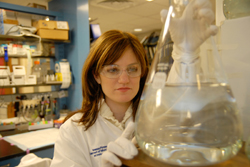Curriculum
All students must successfully complete the core curriculum before advancing the specific program requirements for their degree. The core curriculum is a comprehensive interdisciplinary program of study for all first year master's and doctoral students in the biomedical science programs. The goal of the core curriculum is to provide a broad foundation in biomedical sciences and serve as a framework for advanced study in more specialized areas.
Learn more about the core curriculum
In addition to the core curriculum and other required courses, in the first year, student must complete the research laboratory rotations. These research rotations give students the opportunities to obtain broad research training and help them select a thesis research advisor by the end of the first twelve months. In the second year, students begin thesis research and take several advanced courses, tailored to the students' individual interests.
The Molecular & Cell Biology & Genetics program offers a weekly seminar series with invited external and internal speakers who address the program's broad research interests. Journal Club members meet weekly in an informal setting to present results of interest from the current literature.

In the Molecular & Cell Biology & Genetics Master's program, the focus is on strengthening the student's grasp of molecular biology and biotechnology and on providing knowledge of research methods available in the fast-expanding field. The program offers both a thesis-based degree and a non-thesis based degree tracks. In the thesis track, MS students will have specific research goals, relating a chosen area of molecular & cellular biology & genetics. In the non-thesis track, students can earn the MS degree by taking additional classes and writing a literature review paper. A minimum of two years of full-time study is required for a master's degree.
The Molecular & Cell Biology & Genetics PhD program trains individuals to become independent researchers and educators in related fields of studies. The PhD candidates must pass a qualifying examination by November 1st of their third year. During the course of the program, the PhD candidates must also submit at least one manuscript and prepare a second manuscript for publication. The average amount of time required to complete the PhD requirements is five years.
Available Minors
- Graduate Minor in Drug Discovery and Development
The graduate minor in Drug Discovery and Development provides exposure to the multiple elements involved in the discovery and development of prescription medications. It has been designed to familiarize students with important applications of biomedical research and to facilitate a transition to the pharmaceutical or biotechnology industry.
- Graduate Minor in Clinical Research Organization and Management
The minor in Clinical Research Organization and Management provides exposure to several important elements involved in the development of new therapeutics. This program has been designed to help students transition to a productive career within the pharmaceutical and biotechnology industry.
Program Level Outcomes
Graduates of the Master of Science/PhD in Molecular & Cell Biology & Genetics program will achieve nine program level outcomes that describe the skills, competencies and knowledge gained through completion of the program curriculum.
- Be prepared to acquire independent and competitive careers in scientific research
- Have the skills to function on and lead interdisciplinary and multidisciplinary teams
- Be able to use and apply state-of-the-art techniques to conduct independent and collaborative scientific investigations
- Have the ability to independently and broadly explore the scientific literature and develop novel hypotheses based upon the existing knowledge base
- Have the ability to combine the existing scientific knowledge and the results of their own scientific investigations to develop novel avenues of research
- Be able to identify problems and troubleshoot in scientific investigations
- Have a broad education in biomedical sciences so as to understand the impact of scientific investigations on human society
- Be able to effectively communicate science, in written and oral formats, with a wide range of audiences including both scientists and non-scientists
- Understand and abide by ethical and professional standards of the field